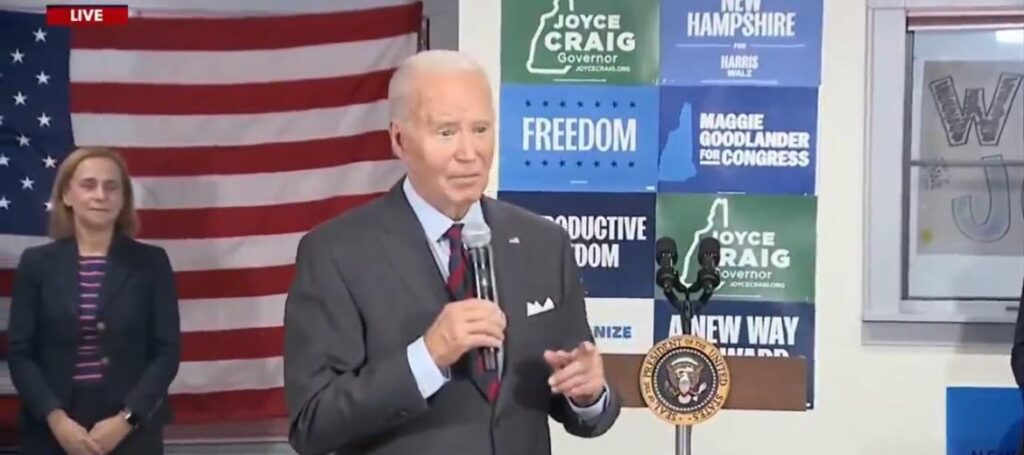During a recent visit to a Democratic campaign office in New Hampshire, President Joe Biden made headlines by openly calling for the jailing of his main political rival, former President Donald Trump. This bold statement was made just 14 days before the election, highlighting the intensifying political climate as the November polls approach. Biden’s exact words were, “We gotta lock [President Trump] up,” a declaration that has stirred significant controversy and debate among supporters and opponents alike, drawing attention to the underlying tensions leading into the election.
In his remarks, Biden referenced the ongoing legal challenges facing Trump, indicating a belief in the validity of the charges against him. Earlier this month, he admitted that his Department of Justice (DOJ) was working to resolve these issues post-election, framing Trump’s legal troubles as a form of accountability for perceived wrongdoing. Biden specifically cited “the same guy who has three other major cases waiting for him when he loses,” suggesting that Trump’s legal issues are not only serious but also intertwined with the electoral process, casting a shadow over the upcoming election.
Biden’s comments brought to light his deep-seated frustrations regarding Trump’s legal issues, particularly referring to the 34 felony counts against him. The president’s remarks also hinted at his satisfaction with the DOJ’s involvement and its efforts to hold Trump accountable. Biden stated, “He got the sentence kicked back, but I want to watch that sentence,” indicating his desire to see Trump face consequences for his actions. This expression of eagerness to witness potential judicial outcomes has raised questions about political ethics and the role of the judiciary in electoral politics.
Critics have labeled Biden’s statements as dangerously partisan and indicative of a broader political witch hunt, claiming that it undermines the integrity of the electoral process. They argue that openly calling for a political rival’s imprisonment reflects a troubling precedent in American politics, where adversaries are treated not just as competitors in an election but as figures to be brought down legally. This narrative has been fiercely echoed by Republicans and some independents who view Biden’s remarks as an attack on democratic principles.
Furthermore, Biden’s comments have reignited discussions about the implications of using legal avenues in political disputes. Supporters of Trump have argued that the current legal battles are driven more by political motivations than by genuine legal concerns. They assert that Biden’s public commentary illustrates a fundamental misuse of power by the president, suggesting that the administration is leveraging legal processes to target political opponents rather than focusing on governance and policy issues that resonate with American voters.
As the election draws near, Biden’s statements serve as a reminder of the high stakes involved in the political arena. His calls for accountability juxtaposed with accusations of misuse of power create a complex narrative that holds significant implications for voter sentiment. With tensions running high and both parties mobilizing their bases, the unfolding legal and political drama surrounding Trump and Biden is poised to play a critical role in shaping the outcomes of the impending election.

